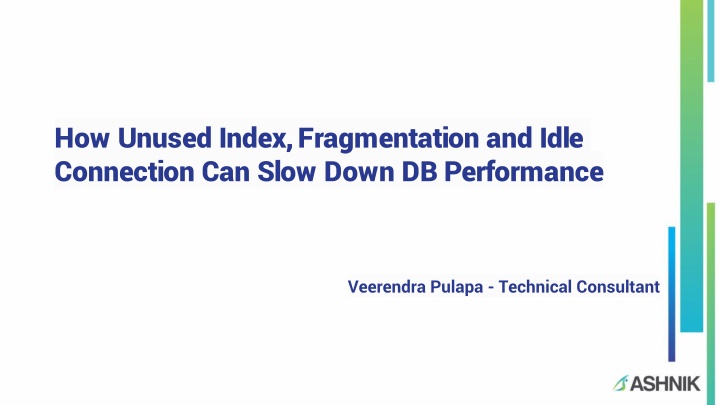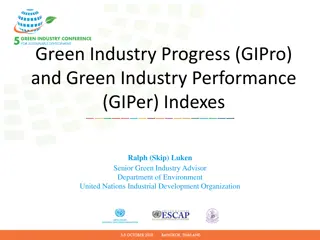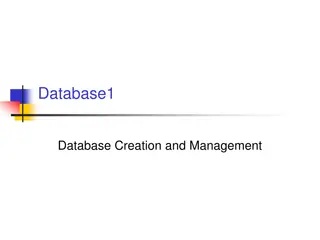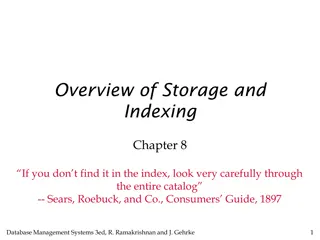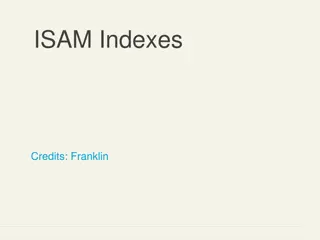Enhancing Database Performance: Unused Indexes, Fragmentation, and Idle Connections
Veerendra Pulapa, a Technical Consultant at Ashnik with 6+ years of experience, highlights how unused indexes, fragmentation, and idle connections can slow down database performance. He emphasizes the importance of database maintenance in PostgreSQL operations for optimal performance and reduced downtime.
Download Presentation

Please find below an Image/Link to download the presentation.
The content on the website is provided AS IS for your information and personal use only. It may not be sold, licensed, or shared on other websites without obtaining consent from the author.If you encounter any issues during the download, it is possible that the publisher has removed the file from their server.
You are allowed to download the files provided on this website for personal or commercial use, subject to the condition that they are used lawfully. All files are the property of their respective owners.
The content on the website is provided AS IS for your information and personal use only. It may not be sold, licensed, or shared on other websites without obtaining consent from the author.
E N D
Presentation Transcript
How Unused Index, Fragmentation and Idle Connection Can Slow Down DB Performance Veerendra Pulapa - Technical Consultant
About Me Name: Veerendra Pulapa Current Position: Technical Consultant at Ashnik Education: Bachelor Degree, JNTUH Relevant Experience: 6+ years of experience in database administration and its implementation Proficient in SQL and NOSQL Expertise in database design, implementation, performance tuning and optimization Certifications: PostgreSQL & YugaByte Certified Professional Professional Achievements: Reduced database downtime by 50% through implementation of automated monitoring and alerting tools(My Postgres) Designed and implemented a disaster recovery plan that reduced data loss from hours to minutes in the event of a system failure
About us A leading open source technology partner for the digital-first era Since inception in 2009, enabled over 200 leading enterprises across SE Asia & India Enabling the adoption of right-fit open source solution and technologies End-to-end digital transformation specialists - Consultation, Services, Support & Training Cross industry experience in BFSI, Telco, Govt, Retail, E-commerce and more
Database Server Dealing with large amount of data. Providing concurrent access control. Storing applications and non- database files. Central management of data
Database Center Of Attention Everyone always pointing at database First. (Apps crash, Apps slow, Apps not accessible). Database is vital object for the production availability. Data is the new gold.
Maintain your database performance 1. Database maintenance is a highly neglected topic in daily PostgreSQL operation. 2. Common understanding that database performance maintenance need to be done regularly and essentially. (only a few users are aware of the extra work that goes into it) 3. Database maintenance works is rarely come out due to the lack of in-depth knowledge of SQL itself, and not able to carry out the tasks with efficient timelines.
Dont Neglect Routine Maintenance Vacuum in PostgreSQL to prevent dead tuple or wrap around situation. PostgreSQL Visibilityand currentstatistic refresh. Automatic vacuum and analyze Postgres. Reindexing index. Database Log monitoring
Any other reason that brings down PostgreSQL performance?
Fragmentation Fragmentation allow user to control where data is stored at table level. When a block of data is being read in Postgres by one transaction, a second transaction may be in the process of updating or deleting it. These deletes and updates accumulate as many dead tuples. This collection of dead tuples is what we refer to as bloat . Large amount of dead tuple will be degrade the performance.
How to identify and control? Pgstattuple extension CREATE EXTENSION pgstattuple; Select pgstattuple(<table>); Sample output:
Unused Index Index are not always useful. Are you sure index increase your data retrieval process? Consider deleted unused index.
What? Increased write time Increased query time Increased maintenance overhead Increased disk space usage How? Pg_stat_user_indexes SELECT schemaname, relname, indexrelname, idx_scan, idx_tup_read, idx_tup_fetch FROM pg_stat_user_indexes WHERE idx_scan = 0; Monitor performance metrics Analyze query plans
Idle Connection Connection established between process Session looks for the required page in its own shared buffers. If it can t find the page in shared buffers, it fetches the page from the operating system (OS) cache As the count of the PostgreSQL connections increases, the free memory available for the OS cache goes down. If the instance is low on free memory, it starts using the swap space, which is again on the storage volume and therefore slow.
How and what? Connection Pooling Long-Running Queries Session Management
Recomdentation Optimize queries Indexing Vacuum and Analyze Increase memory Configure PostgreSQL Upgrade hardware Use partitioning Use connection pooling Use a caching layer Use a content delivery network (CDN) Use a query cache Monitor and optimize your PostgreSQL configuration
